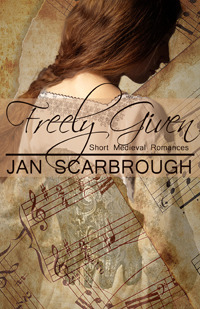Freely Given (Medieval Romances)
 Freely Given is a series of four, short romances depicting the lack of control a Medieval woman experienced in choosing her marriage partner. Noble marriages were arranged by king and family. What happened if the woman did not freely give consent?
Freely Given is a series of four, short romances depicting the lack of control a Medieval woman experienced in choosing her marriage partner. Noble marriages were arranged by king and family. What happened if the woman did not freely give consent?
Available at Amazon for Kindle
The Troubadour
Courtly love, as sung by troubadours, was often a refuge for Medieval wives. Yet, its basis was fantasy, a far cry from the harsh realities of everyday life. Will an unwilling bride find courtly love and satisfy the longs of her romantic heart?
The Novice
Can a Medieval woman who doubts her vocation to the Church find true love in an arranged marriage?
The Betrothed
Marriage based on love was foreign to the Medieval mind. Yet consent had to be freely given for a marriage to be valid. Can a reluctant bride dare refuse her betrothed without suffering the consequences?
The Duke
A trip to the British museum in London catapults a modern exchange student back in time to a tragic life shrouded in secrecy, lust, and true love.
Excerpt from The Betrothed
The great hall is crowded with strangers—knights, men-at-arms, squires—all in attendance to Sir William. My household servants are busy with their morning tasks. In the kitchen outside, Cook prepares the midday meal. I spy my seneschal and nod to him. And then I catch Sir William’s eye. My heart quickens. I am afraid, but I extend my hand as he approaches.
This time he cannot see the outline of my body beneath my gown. I am suitably dressed, as befitting my station. I am the lady of the household, an earl’s only daughter and heir. All of this is still mine and will continue to be once our betrothal is broken.
He bows over my hand. “Lady Eleanor, God give you health, honor, and joy.”
At the mention of “honor,” he lifts his head and raises a dark eyebrow suggesting the night of our wedding. I cannot snatch my hand away, because everyone is watching. Instead, I curtsy as is proper.
“And God give you pleasure, peace, and health,” I answer, knowing full well what pleasure he wants from me.
“Walk with me and show me your household.”
My betrothed places my hand on his outstretched arm and leads me through the great hall to the door at the far end. People stand aside as we pass. We process as if already married, the lord and his lady, letting ourselves be seen by one and all.
DeHart Castle is a strong, square fortress with round towers at each corner and a moat fed by springs. We have a drawbridge and a stately entrance guarded at all times. We stroll through the bailey, stopping at the mews and the stables, viewing the small church where we are to be wed.
Once again we pause in the garden with its heady aroma of lilies and lavender. We are alone.
I take a deep breath. “My lord, I will not marry you,” I blurt out.
He turns to me, his eyebrows drawn down in a puzzled frown. “What say you?”
“I do not consent to our marriage.” I raise my chin and stand tall.
His gloved hand squeezes mine. “You have no say in the matter.”
“I do,” I remind him. “If I refuse, my chaplain will not marry us and the church will not recognize the union.”
“What game is this you play?”
“No game, my lord.” I pull my hand from his grasp. “You do not suit me. I repudiate a contract made against my will.”
His eyes flicker and his jaw tenses. He is not happy with me, but takes my measure nonetheless. “You defy convention and the order of your father. We have an agreement. King Edward bids us marry on the morrow. My men and I will depart for the coast in three days. You, Lady Eleanor, will not dare disobey the command of the king.”
“You know not what I dare,” I say in a hushed voice, knowing I am in danger.
“Forgive me. I have underestimated you, my lady.”
“Many have,” I reply and then turn away. My lord lets me go.
I resist the urge to look at him again. To gauge what he is thinking. Sir William has not reacted like I supposed he would. I thought he would rage and threaten. He has not. I fear this is not the end of the matter.



